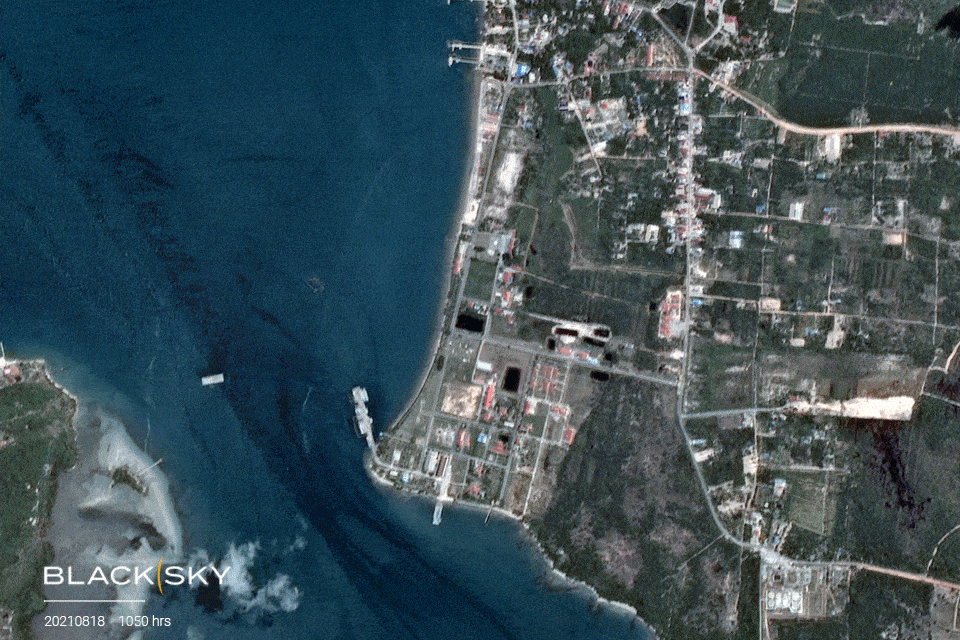
Imagery of Near-Complete Chinese Military Naval Station in Cambodia. Image – Black Sky
On July 24, BlackSky Technology, Herndon, Virginia, published a series of satellite images showing the rapid development of a large Chinese naval facility in Ream, Cambodia, from August 2021 to July 2023. The facility first came to light when The Wall Street Journal published a report in 2019 that U.S. officials had seen a secret agreement that gave China access to about one-third of the Ream naval base for up to 30 years. The base had previously been an area of U.S. cooperation with Cambodia, including the funding of the construction of two buildings. One of those buildings was subsequently demolished in 2020.
While Chinese interest in the Ream naval base is not new, the rapid development of the facility has raised concerns in the West about China’s expanding reach.
Beijing opened its first overseas military base in Djibouti, not far from the U.S. base in the country strategically located on the busy Bab el-Mandeb Strait. The strait connects the Red Sea to the Gulf of Aden and the Indian Ocean and is a major route for seaborne trade.
BlackSky’s 10-image collection of the Ream base revealed similarities to China’s Djibouti facility, including an angled deep-water pier about 1,190 feet (363 m) long that could accommodate any ship in the Chinese fleet, including the 980-foot (300-m) aircraft carrier Fujian.
Beijing is believed to have around four overseas military facilities, which have all opened in the last six years. While a small number overall, their proximity to the U.S. and allied countries has raised flags.
In April 2022, China signed a security pact with the Solomon Islands granting it rights to send security and naval contingents to the island country. Prime Minister Manasseh Sogavare has insisted that there are no plans to allow China to build a military base on its territory. However, he has since requested a review of a 2017 security pact with Australia, likely to prevent an overlap in commitments. The potential for China to station troops around 1,200 miles (2,000 km) off the Australian coast has created concern in the West.
More recently, there have been reports that China and Cuba have been negotiating to establish a joint training facility on the island. The Wall Street Journal has reported a secret agreement to set up a Chinese eavesdropping facility. Such a base would be 100 miles (160 km) off the U.S. coast. The Biden administration confirmed in June that the U.S. government had been aware of a Chinese spy base in Cuba since at least 2019.
China appears unlikely to stop there. According to a Rand Corp report in December 2022, potential locations for future Chinese overseas bases include Bangladesh, Burma, Cambodia and Pakistan. These countries face acute security threats, Accordingly, they may see closer ties to China, including a military presence, as providing a boost to security.
For China, moving closer to such countries poses its own risks, including potentially getting drawn into local conflicts. Instability or regime collapse could reduce the value of their investment, while increasing pressure on China to take action.
For the moment, the U.S. and its allies are approaching China’s overseas expansion with caution. They are likely to maintain a position of non-interference, while making their own countermoves.
This article was originally published on our sister site, Military Periscope, the world’s easiest-to-use, up-to-date, open-source military database covering weapon systems and armed forces from around the world.
Aja Melville is an accomplished editor and analyst with expertise in open-source intelligence (OSINT) and database management. As the Weapons Editor and Analyst at Military Periscope, Aja has applied her analytical skills and in-depth knowledge in military affairs and global defense sector advancements, particularly focusing on China and the Asia-Pacific region.
Aja's commitment to international relations and Asia-Pacific focus is highlighted by her educational background. She holds a Bachelor of Arts in International Relations and Chinese Language from Bard College, complemented by a Certificate of Advanced International Studies from the Bard Globalization and International Affairs Program. Aja further expanded her linguistic skills with a Certificate of Intensive Language Studies in Chinese (Mandarin) from Qingdao University.





